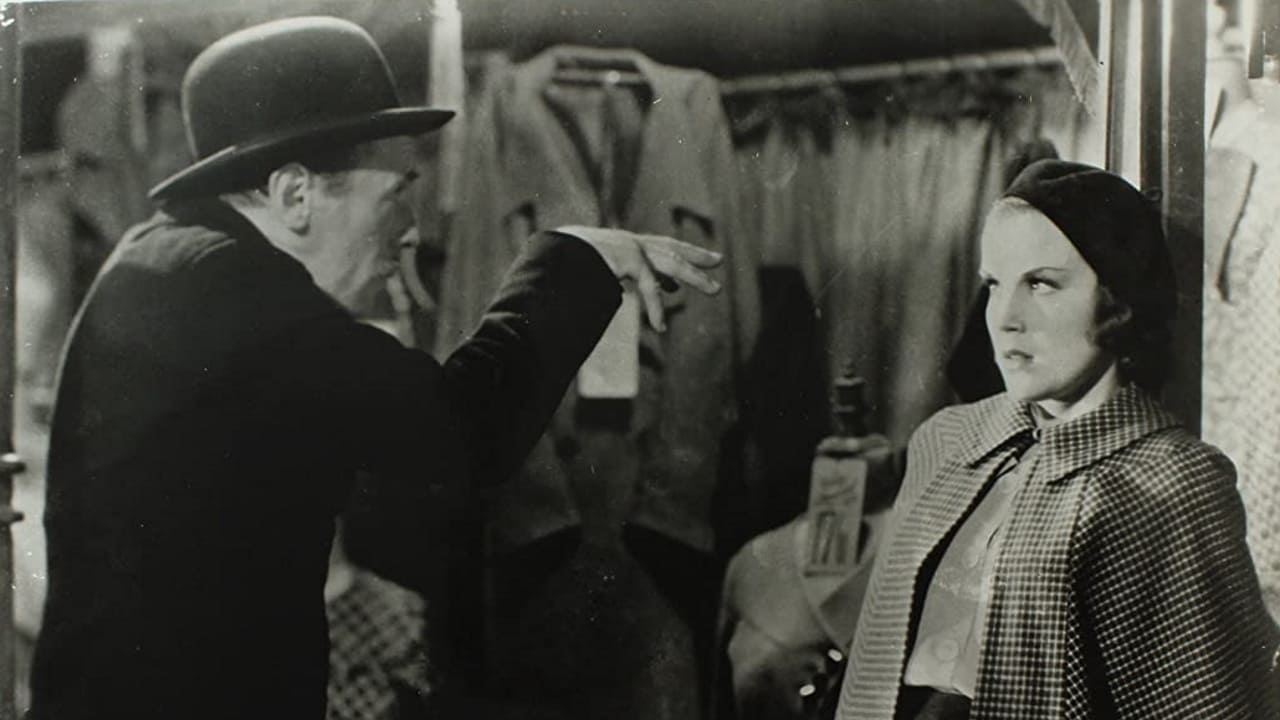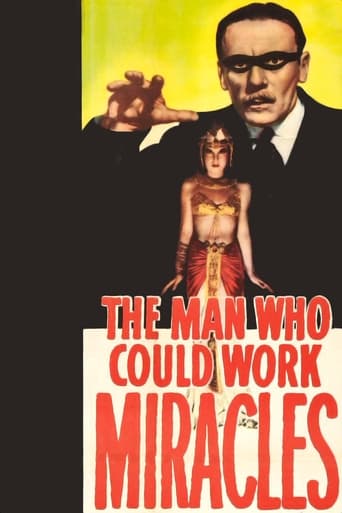

We've probably all fantasized about what we would do with a lot of money. But absolute power? H.G. Wells attacks this question in "The Man Who Could Work Miracles," from 1936, with a screenplay written by Wells himself.This British film stars Roland Young, who played Topper in the movies and also "Uncle Willy" in one of my favorite films, The Philadelphia Story. The gods, Indifference (George Sanders), PLayer (Ivan Brandt) and Observer (Torin Thatcher) discussing the lowliness of humans, wonder what would happen if man had absolute power. One of the gods, to prove a point, points a finger at George McWhirter Fotheringay (Roland Young) out at night, en route to a pub.George, frankly, doesn't do much with his new gift. He turns a lamp upside down, makes kittens and rabbits and fruit appear, cleans up his station at the haberdashery where he works, takes away a coworker's (Joan Hickson) freckles, dresses the beautiful Ada (Joan Gardner) in jewels -- his goals don't seem very lofty. The only thing he can't do is change people.George seeks advice from several people; his boss, who wants George to harness his power only for the store; Ada who believes he should heal people; and finally a vicar, Maydig (Ernest Thesiger) who says, "We'll start the Golden Age tomorrow afternoon" - an age in which there would be no disease, no want for funds, no war. To which George asks, yes, but what will people DO?This is a delightful film that raises obvious questions which the viewer has to answer for oneself. The god at the end of the film sums up my feeling. Nothing changes overnight, if they change at all.Standouts in the film are Young, Thesiger, and of course, Ralph Richardson as a colonel whom the vicar wants stripped of his sword collection and his alcohol. When he finds out that he's sober because of George, he wants to kill him. George Zucco is his butler, uttering the immortal words, "Oh, sir, I'd sooner poison a baby than tamper with the alcohol."Joan Hickson, known to millions as Miss Marple, was a young character woman here and plays Effie. Joan Gardner was discovered by the film's director, Alexander Korda, and actually married his brother Zoltan in 1930. She retired shortly after this film and stayed married to Korda until his death in 1961.Roland Young does an excellent job as a common man in an extraordinary circumstance. He has a slightly confused, vulnerable quality.Wells was prescient in many things, and his ideas always thought- provoking. "The Man Who Could Work Miracles" is no exception. Exceptional special effects for its time and an intriguing story make this film something to see.
... View MoreMovie fanatics will spend hours pondering the many messages of this H.G. Wells story about a mild mannered typical Englishman (Roland Young) who suddenly discovers he has the gift of "miracle giving". Basically, most of it is magic (i.e. turning lamps upside down, raising beds off the floor, erasing freckles off of a co-worker), but as he realizes the consequences of the power he has (having sent a British policeman "off to blazes", then to San Francisco, which alerts the world to something afoot), he begins to get a bit carried away. He finds he can't make the girl he loves fall in love with him, but he can turn whiskey into temperance water and weaponry into agricultural gear. As more people find out about his "gift", he begins to go off to places like a real-life Austrian gentleman was doing over in Germany....Three mystics (wearing more glossy foundation than Tammy Fay Baker) are the ones responsible, revealing that H.G. Wells had some interesting theories about the world outside of our own and some ideas that may not have pleased Christians. Having worked with London films on "Things to Come", Wells is certainly a great storyteller of the supernatural. Young, best known for his role as Cosmo Topper in three films, gives an excellent performance as the man gifted beyond reason. Ralph Ricardson is also outstanding as the military man whose booze is tampered with. George Sanders is instantly recognizable as one of the three mystics. This film has many comedy elements, but is a serious look of humanity and what kinds of harm human failing can bring on if power falls into the wrong hands. Can you imagine the impact this could have if updated towards today? With all the advancements (particularly in technology) the world has seen in the past 75 years since this was made (not "bit by bit" as the immortals think it should be), there is a great message and warning that could be told if the film were to be made correctly with the author's intentions.
... View MoreI can't add much to what has already been said of this wonderful film, but I would like to comment further on an observation made by an earlier reviewer vis-a-vis Ralph Richardson's superb portrayal of Colonel Winstanley.The earlier reviews stated that this character was the inspiration for David Low's immortal Colonel Blimp, but that could not be the case. By 1936 Blimp was a well known cartoon character, Low having begun drawing him for the "Evening Standard" some years before.Having said that, I have not the slightest doubt that the xenophobic, colonialist, anti-science and closed-minded Blimp was the inspiration for Colonel Winstanley.And I have no further doubt whatever that Winstanley was forefront in the mind of Powell and Pressburger when they brought him to life as the much more sympathetic Colonel (later General) Clive Wynn-Candy in the the masterpiece "The Life and Death of Colonel Blimp" eight years later.Having seen "Blimp" many times prior to seeing "The Man Who Could Work Miracles", my ears immediately went up in the scene where the character is first mentioned, thinking Hello, could it be? And then in the next cut, there is Winstanley in all his Blimpish glory and the little light bulb above the head goes off and you get that immensely satisfying moment of having put another film thread together...
... View MoreI saw this movie a couple of years ago when I couldn't get to sleep. I stuck the TV on and this film was just starting.It's about a guy who gets the power to do whatever he wants, except change peoples feelings or minds.Think Bruce Almighty made in the 1930's.I would give this movie a 10, but nothings perfect and the fact that it wouldn't appeal to a mass audience today has forced me to put an 8.Please watch this film if you ever get the chance. HG wells does a brilliant job on writing this one, most of his stories were way before their time, and this is no different.This film really captured my heart, and I really hope it gets a DVD release.
... View More